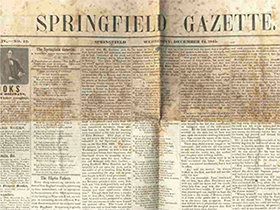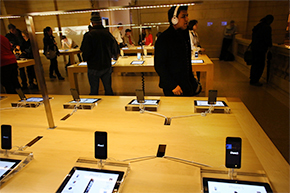Performance artist Mike Daisey, who admitted that he fudged and fabricated anecdotes in his monologue The Agony and the Ecstasy of Steve Jobs
When the technology historians of the distant future look back on 2012, they may remember it as, above all, the year of the apology. Tech companies kept expressing regret for stuff: product flaws, privacy abuses, advertising deceptions and much, much more. Apple, Dell, Google, Microsoft and Nokia were among the industry giants that issued at least one apology. Even seemingly innocent bystanders such as Spike Lee and KitchenAid got sucked into the vortex of remorse.
As is my wont — and in tribute to the late Business 2.0’s 101 Dumbest Moments in Business and Esquire‘s iconic Dubious Achievement Awards — I’ve compiled a list of the year’s biggest tech-related blunders, lapses in judgement, bad behavior and general weirdness. Some of these items were followed by apologies, heartfelt or otherwise; others weren’t but should have been; a few were so self-defeating that they amounted to their own punishment. All of them helped make the year memorable — and collectively, they set a high bar for 2013’s mistakes.
January
1. The not-so-tragic death of a not-very-wonderful dream.
In 2010, Chandrasekar Rathakrishnan’s Fusion Garage removed TechCrunch’s Michael Arrington from his own CrunchPad project and released it as a half-baked tablet called the JooJoo, which failed almost immediately. In 2011, Fusion Garage pretended to be a start-up called TabCo and released a half-baked tablet called the Grid-10, which failed almost immediately. And in 2012? Fusion Garage’s big accomplishment was failing, period.
2. Crime and self-punishment.
After an advertising firm hired by Google pays bloggers to write about Chrome — violating Google’s own rules — the search engine reacts by penalizing its own browser, pushing it down in results for the search term browser for 60 days.
3. Everyone knows it’s Wendi.
The British media are amused by the way Wendi Deng Murdoch, spouse of Rupert Murdoch, bawls out her husband on Twitter. Except it turns out that it’s a fraudulent account — even though Twitter has marked it as “verified,” a supposed guarantee that it’s the real deal.
4. Holy piracy, Batman!
Sweden recognizes Isak Gerson’s Kopimism as an official religion. The creed, which claims 3,000 members, holds that file sharing is a sacred act.
5. The crowd goes wild.
At a new Apple Store in Beijing’s Sanlitun district, 300 people show up to buy new iPhones. The throng alarms store officials, who cancel the opening. The shoppers are not pleased. One of them begins pelting the retail establishment with eggs; others chase off the security guards.
6. Let’s be evil.
A Kenyan business-listing company called Mocality accuses local Google staffers of accessing its data without permission, then contacting its customers and claiming, inaccurately, that Mocality charges for its services and that Google has a relationship with Mocality. Google admits that Mocality’s charges are true and says that it’s “mortified” by the situation.
7. Feats of clay.
In Vancouver, Apple fans discover that the iPads they’ve purchased at Best Buy and other stores are actually iPad boxes filled with modeling clay. It seems that criminals bought iPads and then returned them for refunds — but they kept the iPads and refilled the boxes.
8. Hey, at least Polaroid is still flourishing — oh, wait.
Eastman Kodak, an icon of American technical innovation and business success for the entire 20th century, files for Chapter 11 bankruptcy.
9. Meet Mr. Optimism.
Mike Lazaridis and Jim Balsillie, longtime co-CEOs of beleaguered BlackBerry maker RIM, finally step down. Their successor, RIM co-COO Thorsten Heins, says he doesn’t “think significant change [is] needed” at the company, a stance that leaves observers wondering if he’s been paying attention.
10. Shop till you flop.
After legendary Apple Store chief Ron Johnson departs to run JCPenney, Apple replaces him with John Browett, CEO of British retailer Dixons. His former employer has a schlocky reputation, and a bevy of British tech enthusiasts are befuddled by the hire. But not for long; Browett is gone before the holiday season begins.
February
11. Xoom, Xoom, Xoom.
Motorola says that about 100 refurbished Xoom tablets sold through the daily-deal site Woot may still have their previous owners’ information on them. By way of apology, it offers two years of free credit monitoring to affected consumers.
12. In other news, McDonald’s new Big Mac is ditching the two all-beef patties, the special sauce, the lettuce, the cheese and the sesame-seed bun.
Microsoft reveals that Windows 8 will do away with Windows’ most familiar feature: its Start button.
13. I don’t even want to know what coupons Target sends once it’s figured out you’ve died.
A New York Times article reveals that Target’s mining of its customers’ information is so invasive and clever that the company figured out a high school girl was pregnant — and sent her coupons for products such as cribs and baby clothing — before her parents got wise about it.
14. Sorry, fellas.
A high-tech London billboard for a nonprofit organization uses facial detection to identify bystanders as women or men — and refuses to show its ad to the guys.
March
15. At least they didn’t call it eleventy-billion-G.
An iOS software update changes the 3G indicator on AT&T iPhones to read 4G, even though the phones are running on the same wireless network as before and their speed hasn’t improved. (AT&T, like T-Mobile, has simply decided to start saying that its spruced-up 3G network is a 4G network.) Only with the iPhone 5’s release in September does AT&T get a true 4G iPhone.
16. Oops-a-Daisey.
Public radio’s This American Life retracts an entire episode based on Mike Daisey’s monologue The Agony and the Ecstasy of Steve Jobs. Daisey’s much praised work, based on his visit to Apple’s Chinese manufacturing partner Foxconn, includes alarming details about underage workers, dangerous conditions and other matters — but it turns out that Daisey fudged numerous details to make his story more shocking and melodramatic.
17. Smokin’!
Microsoft’s “Smoked by Windows Phone” competition, which lets Microsoft Store visitors with iPhones and Android phones try to outrace Windows Phone at common tasks, backfires when blogger and Android user Sahas Katta manages to win. Store employees refuse to acknowledge his victory and provide him with prizes, a decision Microsoft overturns after Katta blogs about the experience.
18. Just like Foursquare, only profoundly creepy.
Cult of Mac’s John Brownlee reports on Girls Around Me, an iPhone application that uses publicly available Facebook and Foursquare data to show the photos and locations of nearby women, none of whom have given permission to be tracked by the app. After Foursquare cuts off access to its data, the program’s Russian developers yank it from the App Store.
19. He got lame.
Amid the controversy over George Zimmerman’s shooting of Florida teen Trayvon Martin, moviemaker and Twitter user Spike Lee retweets a Twitter message that supposedly reveals Zimmerman’s home address. Except it’s really the home of David and Elaine McClain, a couple in their seventies, who begin to receive threats and hate mail. They flee to a hotel; Lee apologizes.
April
20. Every Jedi dance now.
Star Wars fans are traumatized by a dance-off minigame in Microsoft’s Kinect Star Wars that shows characters like Han Solo and Lando Calrissian boogying to contemporary music. One devastated blogger says the game “violates our childhood.”
21. Choose your own adventure.
BioWare is forced to promise that it will release free downloadable content for its game Mass Effect 3 — including a revised conclusion — after gamers carp that the original denouement lacks sufficient emotional punch.
May
22. It is true, however, that Rutherford B. Hayes devised a pocket-size phonograph that was eerily Zune-like.
Numerous credible websites report on the amazing discovery that a youthful Abraham Lincoln attempted to patent his idea for local newspapers to give each citizen a personal page to “discuss his Family, his Work, and his Various Endeavors” — in effect, a 19th century dead-tree version of Facebook. It’s a great story. It also happens to be a hoax.
23. What the Dell?!
At a summit held by Dell in Copenhagen, the M.C., notoriously offensive Danish comedian Mads Christensen, rants about women, saying, “There are almost no girls in this room, and I am happy. Why are you here at all?” Dell uses its Google+ page to apologize and says it’ll select entertainment more carefully in the future.
24. Apparently he minored in ill-advised self-aggrandizement.
Barely four months after becoming Yahoo’s CEO, former PayPal president Scott Thompson resigns after activist shareholder Daniel Loeb reveals that Thompson’s official biography includes the false claim that he has a degree in computer science from Stonehill College — an institution that didn’t even offer such a major during Thompson’s school days.
25. All too public.
In one of the most anticipated IPOs ever, Facebook goes public. Nasdaq technical glitches spook investors, which leads to the stock’s tumbling rather than rising, resulting in a flurry of lawsuits.
June
26. Wait till next year.
Still beleaguered BlackBerry maker RIM delays its new BlackBerry 10 devices for the second time. Once expected in early 2012, they now aren’t scheduled to hit the market until early 2013.
July
27. On the plus side, it doubles as a damn fine bocce ball.
Shortly after announcing its first consumer hardware product, Google abruptly suspends sales of the Nexus Q, a mysterious $300 orb that can only stream audio from Android phones running version 4.1 Jelly Bean. (The New York Times‘ David Pogue calls it “baffling.”) Those who have already preordered the Q get a developer version for free.
28. Oh, the hilarity.
Microsoft apologizes when someone digs into its Hyper-V virtualization server and discovers that some prankster at the company has designed the software to use the hexadecimal code snippet 0xB16B00B5 — “big boobs” — whenever a user loads Linux onto a virtual machine.
29. Shell game.
Media outlets report on Shell’s misguided attempt to crowdsource an ad campaign for its “Arctic ready” drilling efforts, which prompts an avalanche of creatively cynical, satirical contributions. But it turns out that the whole thing, including a launch event at Seattle’s Space Needle, is a hoax staged by Greenpeace.
30. Freedom of, um, tweetch.
During the Olympics, British journalist Guy Adams of the Independent, who’s unhappy with tape-delayed event broadcasts, tweets the work e-mail address of an NBC vice president so his followers can register their disapproval. In response, someone at NBC complains to someone at Twitter, an official NBC partner for the Olympics, and Adams’ account is suspended. After thousands of tweets in support of Adams, Twitter apologizes and reinstates him.
August
31. Sorry, Safari.
The FTC fines Google $22.5 million, settling a case that accused the search giant of overriding the privacy settings of Safari users to serve targeted advertising. In levying the penalty, the agency chastises Google for violating a 2011 settlement over its ill-fated Buzz service.
32. If it ain’t broken, break it.
Newly minted Apple Store leader John Browett reportedly aims to boost the chain’s profit margin by ordering a hiring freeze and cutting back the hours of store employees. The move becomes a news story, denting the stores’ reputation for exceptional customer service. Before long, Apple undoes Browett’s plan and says it was “a mistake.”
33. Funny, Metro-Goldwyn-Mayer seemed O.K. with it.
German retailing giant Metro A.G. is reportedly unhappy with Metro, the radically new user interface seen in varying forms in Windows 8 and Windows Phone. Microsoft responds by discontinuing use of the Metro name. But rather than replacing it, the company wavers, calling the interface by several different names — none of them very catchy — including “the Modern UI,” “the Windows 8–style interface” and “the new user interface.”
September
34. The art of overpromising.
At a splash launch event in Santa Monica, Calif., Amazon CEO Jeff Bezos calls the company’s new Kindle Fire HD the best tablet available at any price. The first reviews aren’t exactly raves, in part because the software is buggy but also because reviewers instinctively zero in on Bezos’ overreaching claim and use their stories to explain at length why the Fire, despite its multiple virtues, isn’t in fact the best tablet available at any price.
35. Moto no go.
In a forum posting, Motorola, which had promised to release upgrades for all its Android phones for at least the first 18 months after their release, informs customers that some models won’t be getting Ice Cream Sandwich after all.
36. Optic fable-ization.
Nokia bases much of the publicity campaign for the Lumia 920 smart phone, its new flagship product, on the Windows Phone handset’s impressive PureView photo and video capabilities. But as online news site the Verge reports, it turns out that Nokia faked its demos of the 920’s optical-image-stabilization technology: neither the still pictures nor the video were shot with a Nokia phone. (A reflection in a trailer window reveals what seems to be a professional camera crew.) Nokia fesses up and apologizes.
37. RIM Slowwagon.
At RIM’s BlackBerry Jam developer conference, the keynote on the much postponed BlackBerry 10 operating system includes a curious rock video, based on an REO Speedwagon song, in which a bestubbled Alec Saunders, the company’s vice president of developer relations, acknowledges the delays and promises to “keep on loving” developers.
38. Pat that man down!
For an investigative report, ABC News “accidentally” leaves 10 iPads at security checkpoints in U.S. airports. Nine are returned; the 10th is not. The network’s reporters use the Find My iPad feature to track the tablet to the home of startled TSA employee Andy Ramirez. He claims that his wife brought it home, but the TSA doesn’t buy the alibi, and he loses his job.
39. You could always just stop and ask someone for directions.
The new Maps app in Apple’s iOS 6, introduced by mobile-software chief Scott Forstall at a WWDC keynote in San Francisco, has spoken turn-by-turn directions and looks beautiful. But users around the world quickly discover that its mapping data, compiled by Apple itself to replace the Google Maps info in previous versions, is, ahem, rough around the edges. It shows businesses that closed in the last century as still being extant, misplaces landmarks (including at least one Apple Store) and is ignorant of the very existence of Shakespeare’s hometown, Stratford-upon-Avon, in England.
October
40. Who’s sorry now?
After Apple iOS honcho Scott Forstall suddenly leaves the company — apparently not by choice — the Wall Street Journal reports that his termination came after he refused to sign a public apology for the Maps fiasco. (His boss, CEO Tim Cook, ends up being the one who shoulders the blame.)
41. It’s the Microsoft Store. Any publicity is good publicity.
At a concert held by the Source at an Atlanta Microsoft Store, rapper Machine Gun Kelly leaps onto a table, spouts obscenities, flips off concerned employees, reportedly tramples five computers and refuses to come down. Cops are called to help escort Kelly out; he proudly tweets about the event. Microsoft stresses that it wasn’t the event’s sponsor and says Kelly’s behavior was inappropriate.
42. Stick to building refrigerators, KitchenAid.
Appliance maker KitchenAid inexplicably tweets a bad-taste joke about Barack Obama, followed by an apology. The company says an alleged social-media maven on its Twitter team accidentally tweeted a joke meant for a personal account.
43. And he seemed like such an honest young man.
A U.S. district attorney announces that Paul Ceglia has been arrested and charged with mail and wire fraud. In a 2010 lawsuit, Ceglia had claimed that a 2003 agreement between him and Mark Zuckerberg entitled him to a 50% ownership stake in Facebook. The feds say Ceglia tampered with the contract and forged e-mails between himself and Zuckerberg.
44. Superstorm, meet superjerk.
During the devastating Sandy storm, Twitter user @ComfortablySmug tweets breaking news about the destruction, claiming that the New York Stock Exchange is flooded and Governor Andrew Cuomo is trapped. His much retweeted alerts are alarming — and utterly false. The perpetrator turns out to be Shashank Tripathi, a hedge-fund analyst and campaign manager for a Republican congressional candidate. He apologizes and resigns his campaign post.
November
45. If it displeases the court.
A U.K. court that had ordered Apple to post a statement on its site saying Samsung’s Galaxy Tab tablet didn’t infringe on the iPad’s design tells Apple it must rewrite its prickly first version, which points out Apple’s court victories over Samsung in the U.S. and Germany and reminds readers that the iPad far outsells the Galaxy Tab.
46. Twitter defeats Trump.
On election night, @realDonaldTrump is appalled by the results and says that Barack Obama won the Electoral College (correct!) despite losing the popular vote (incorrect!). He calls the election “a sham and a travesty” and calls for a revolution. Trump eventually deletes some of his more agitated tweets but doesn’t rescind his call for insurrection.
47. Try to remember the month of December.
The Android Police blog discovers that the Contacts app in Jelly Bean 4.2, Google’s newest mobile operating system, doesn’t have any way to enter December birthdays and anniversaries.
48. File under “Guns, Jumped.”
After Mitt Romney fails to become the next President of the U.S., his campaign accidentally launches a transition site that assumes he’s been elected. Featuring details on the Inauguration and nominees, it comes down quickly — but not before Taegan Goddard of Political Wire grabs some screen shots.
49. Haunted by the ghost of Léo Apotheker.
HP announces a stunning $8.8 billion writedown, accusing Autonomy — a U.K. software company it bought during Léo Apotheker’s brief tenure as CEO — of manipulating its financial results as an independent company to make its sales look misleadingly impressive.
50. Torn between two tablets.
Oprah Winfrey sings the praises of Microsoft’s Surface tablet in a tweet to her 15 million Twitter followers, saying she’s bought 15 as Christmas gifts. Observers who are paying close attention notice that she sent said tweet from … her iPad.
51. Who needs reporting when you’ve got the echo chamber?
A sizable percentage of the tech-news Web dutifully reports on Google’s acquisition of a little-known public wi-fi company named ICOA. One problem: the news originated with a press release from PRWeb that isn’t backed up by any acknowledgement whatsoever by either Google or ICOA. It turns out that the press release is a fake, rife with typos and other clues that it’s a sham.
52. Scroogle you.
Microsoft launches “Scroogled,” an ad campaign that says Google’s practice of selling paid placements in its shopping search engine violates the company’s famous “Don’t be evil” mantra. Confusingly, Microsoft’s own Bing shopping engine also sells paid placements.
December
53. Memo to criminals: Probably smarter to use Google+.
New York City police bust a Bronx gang and indict it for conspiracy to commit murder, weapons and narcotics possession and more than 35 related counts. The incriminating evidence includes conversations the accused conducted on Facebook, using an apparently not-very-effective secret system of code words, like yams for drugs.
54. Sorry, too confusing.
Antivirus tycoon John McAfee, on the run from Belize authorities who want to question him regarding his neighbor’s murder, apologizes for forging the geographic data embedded in a photo that seems to suggest — wrongly, he says — that he’s in Guatemala. Then when it turns out that he is in Guatemala, he apologizes for claiming the geographic data was forged when it wasn’t.
55. Bad Santa.
On the Facebook page for the Maine Mall in Portland, angry parents accuse the shopping center’s Santa Claus of rude behavior like telling a girl who wants an American Girl doll that she’ll be receiving an American football instead. The mall responds by sacking Santa.
56. No sail.
Venus, the 256-ft. (78 m) superyacht Steve Jobs commissioned from design superstar Philippe Starck, is briefly impounded in the Netherlands as Starck and Jobs’ heirs wrangle over the fee owed to Starck. (Starck and his client apparently had a rather informal agreement on the terms of their deal.)
57. It’s like an initiation into the Facebook family.
Beloved photo-sharing service Instagram, which Facebook acquired for $715 million in September, confuses and alarms users with revisions to its terms of service that suggest it plans to use their photos in ads and possibly sell them without permission or compensation. Company co-founder Kevin Systrom says the company isn’t planning anything nefarious, but that doesn’t do enough to calm everyone down, so Instagram reverts to its original terms of service. Even so, the kerfuffle inspires a class action.


























